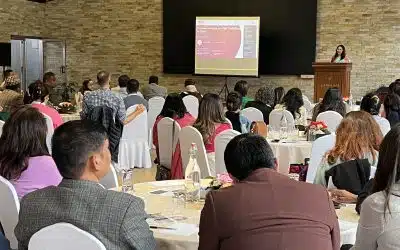InAsia
Insights and Analysis
Data-Driven Policymaking in Cambodia: Progress and Challenges
August 31, 2022
Data and policymaking

To meet its commitment to become a middle-income country by 2030 and a high-income country by 2050, Cambodia must continue to raise its data-for-policymaking game (photo: Kalr Grobl / The Asis foundation).
On February 20, 2021, Cambodian prime minister Hun Sen announced a third outbreak of Covid-19 with the discovery of 32 cases of community transmission, the most recorded in a single incident. Based on this data, the government took immediate steps to protect the public health, including a lockdown, travel restrictions, and a curfew.
Covid-19 had a serious impact on Cambodia’s economy. Reliable economic data showing significant downturns in the tourism sector and small and medium enterprises spurred the government to provide economic relief. As of May 2022, the government had distributed USD 653 million in cash benefits to 686,773 households USD 653 million in cash benefits to 686,773 households.
By late 2021, Cambodia’s vaccination rate had reached 85 percent, among the world’s highest, and the number of Covid-19 cases had plummeted. In November, the prime minister declared the country “fully reopened.”
This is data-driven policymaking. Rates of community transmission, the decline in tourism and small-business revenue, and the vaccination rate are essential data for government interventions in public health and the economy. Where else has Cambodia made progress in data-driven policymaking, and what are the challenges and the opportunities for improvement?
This article offers an overview of data-based public policymaking in Cambodia, based on The Policy Process and Use of Data: The Case of Cambodia and Insights from ASEAN, a diagnostic study supported by the Australian Department of Foreign Affairs and Trade (DFAT) through The Asia Foundation’s Ponlok Chomnes program.
How Cambodia uses data in the policy process
The public policy process in Cambodia involves three main stages: formulation, implementation, and monitoring and evaluation (M&E). Data for this process comes from two main sources: government agencies, and nongovernment actors including development partners, NGOs, research institutes, and academia. This data is of three main types: (1) national data such as the census and the national survey by the National Institute of Statistics, (2) administrative data produced by government agencies, and (3) research data collected by development partners and NGOs.
At the policy formulation stage, the government generally depends on national census data, data from development partners, and administrative data from government ministries. At the implementation stage, the ministries and agencies mainly use their own administrative data to monitor implementation and produce progress reports. The M&E stage uses data on activities, outputs, and budget execution produced by the relevant ministries.
Data is increasingly used for public policy purposes
Data has a growing role in public policymaking in Cambodia, for several reasons. One is Cambodia’s commitment to the reforms needed to become a middle-income country by 2030 and a high-income country by 2050. Another is the growing influence of young technocrats and professionals in key ministries such as the Ministry of Economy and Finance. A third is the rapid proliferation of young internet users who share their views online. Public opinion posted on Facebook has become another form of data influencing government policymaking. In early August, for example, the government decided to cancel the clearing and development of the Phnom Tamao Forest because of concerns raised on Facebook, including a video that was shared more than 5,000 times in late April.
To encourage more data use, the government has established online platforms for data sharing, such as the Commune Database (which shares socioeconomic data collected by these local government units), CamStat (which publishes ministry data for public use) and CamDx (an online exchange for state and private-sector data).
To complement the government’s efforts, international donors like DFAT have supported knowledge-sector initiatives like The Asia Foundation’s Ponlok Chomnes program, which supports local research institutes, think tanks, and young researchers, specifically including women.
Despite progress, both government and nongovernment users still have limited access to existing data.
On the government side, the mechanisms for data-sharing are still weak, and budgets and technical staff are inadequate. Camstat is still under development and has many technical issues. The Commune Database is hindered by time-consuming data entry procedures and bureaucratic inertia.
On the nongovernment side, administrative data that supports policy recommendations is often unavailable due to a lack of trust and collaboration between government and nonstate agencies, and inadequate guidelines for the sharing of government data make it hard for the public to access it.
Data sharing among nonstate users is uneven. Local think tanks and research institutes do not yet have the capacity to harness the “big-data” power of datasets produced by development partners like the World Bank. These nonstate agencies are also data producers, but the large-scale samples that policymakers value are too costly to be produced by small and medium-sized institutions.
Key considerations for the improvement of data-driven policymaking
There are several ways that stakeholders can promote data for policymaking in Cambodia.
The government must improve data sharing among the ministries and make this data available to the public, especially large datasets such as socioeconomic surveys and budget-related data. CamStat is a good start, but sound data-sharing policies and procedures must be put in place.
The government must build the capacity of its technical staff, and improve collaboration with nonstate actors such as local research institutes and think tanks. The data collected by these organizations, though smaller in scale, can be useful for monitoring the progress of specific policy implementations.
Building trust between state and nonstate actors is crucial to effective data sharing. Engaging government policymakers in the research process itself would be a good step for nonstate agencies and would help to match the data supply with the demand, as small-scale surveys can be more useful to policymakers if the data producers know in advance what data is needed.
The government prefers studies that provide practical recommendations and include international and regional insights. Building nonstate actors’ capacity to use open-source data of the sort provided by the ASEAN Statistics Division and development partners such as the World Bank and the IMF will be an important part of this effort.
Civil society already produces a lot of data. That data is stored all over the place and often doesn’t reach the right users. A solution worth considering might be the establishment of “data intermediaries” to act as clearinghouses for collaboration and data sharing. The concept is a bit new and will require some study to identify risks and opportunities.
Data is increasingly important to Cambodian policymaking, but data from the private sector is still greatly underused, and access and sharing between state and nonstate data producers must improve. Finding ways to harness and share this data should be considered a public policy priority.
Read the report, The Policy Process and Use of Data: The Case of Cambodia and Insights from ASEAN
Prak Rathyrea is a senior program officer for The Asia Foundation in Cambodia. He can be reached at [email protected]. The views and opinions expressed here are those of the author, not those of The Asia Foundation.
About our blog, InAsia
InAsia is posted and distributed every other Wednesday evening, Pacific Time. If you have any questions, please send an email to [email protected].
Contact
For questions about InAsia, or for our cross-post and re-use policy, please send an email to [email protected].The Asia Foundation
465 California St., 9th Floor
San Francisco, CA 94104
The Latest Across Asia
News
April 2, 2024
Program Snapshot
March 28, 2024
Program Snapshot
March 28, 2024
Program Snapshot
March 25, 2024

2024 Lotus Leadership Awards
Thursday, April 25, 2024, New York City
The Lotus Leadership Awards recognize contributions towards gender equality in Asia and the Pacific







0 Comments